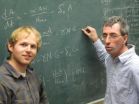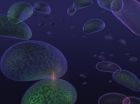Ancient Arabic writings help scientists piece together past climate
Iraqi sources from 9th and 10th centuries give new meteorological insights
2012-02-27
(Press-News.org) Ancient manuscripts written by Arabic scholars can provide valuable meteorological information to help modern scientists reconstruct the climate of the past, a new study has revealed. The research, published in Weather, analyses the writings of scholars, historians and diarists in Iraq during the Islamic Golden Age between 816-1009 AD for evidence of abnormal weather patterns.
Reconstructing climates from the past provides historical comparison to modern weather events and valuable context for climate change. In the natural world trees, ice cores and coral provide evidence of past weather, but from human sources scientists are limited by the historical information available. Until now researchers have relied on official records detailing weather patterns including air force reports during WW2 and 18th century ship's logs.
Now a team of Spanish scientists from the Universidad de Extremadura have turned to Arabic documentary sources from the 9th and 10th centuries (3rd and 4th in the Islamic calendar). The sources, from historians and political commentators of the era, focus on the social and religious events of the time, but do refer to abnormal weather events.
"Climate information recovered from these ancient sources mainly refers to extreme events which impacted wider society such as droughts and floods," said lead author Dr Fernando Domínguez-Castro. "However, they also document conditions which were rarely experienced in ancient Baghdad such as hailstorms, the freezing of rivers or even cases of snow."
Baghdad was a centre for trade, commerce and science in the ancient Islamic world. In 891 AD Berber geographer al-Ya'qubi wrote that the city had no rival in the world, with hot summers and cold winters, climatic conditions which favored strong agriculture.
While Baghdad was a cultural and scientific hub many ancient documents have been lost to a history of invasions and civil strife. However, from the surviving works of writers including al-Tabari (913 AD), Ibn al-Athir (1233 AD) and al-Suyuti (1505 AD) some meteorological information can be rescued.
When collated and analysed the manuscripts revealed an increase of cold events in the first half of the 10th century. This included a significant drop of temperatures during July 920 AD and three separate recordings of snowfall in 908, 944 and 1007. In comparison the only record of snow in modern Baghdad was in 2008, a unique experience in the living memories of Iraqis.
"These signs of a sudden cold period confirm suggestions of a temperature drop during the tenth century, immediately before the Medieval Warm Period," said Domínguez-Castro. "We believe the drop in July 920 AD may have been linked to a great volcanic eruption but more work would be necessary to confirm this idea."
The team believes the sources show Iraq to have experienced a greater frequency of significant climate events and severe cold weather than today. While this study focused on Iraq it demonstrates the wider potential for reconstructing the climate from an era before meteorological instruments and formal records.
"Ancient Arabic documentary sources are a very useful tool for finding eye witness descriptions which support the theories made by climate models," said Domínguez-Castro. "The ability to reconstruct past climates provides us with useful historical context for understanding our own climate. We hope this potential will encourage Arabic historians and climatologists to work together to increase the climate data rescued from across the Islamic world."
INFORMATION: END
ELSE PRESS RELEASES FROM THIS DATE:
2012-02-27
Japanese scientists have found that the odorous compound responsible for halitosis – otherwise known as bad breath – is ideal for harvesting stem cells taken from human dental pulp.
In a study published today, Monday 27 February, in IOP Publishing's Journal of Breath Research, researchers showed that hydrogen sulphide (H2S) increased the ability of adult stem cells to differentiate into hepatic (liver) cells, furthering their reputation as a reliable source for future liver-cell therapy.
This is the first time that liver cells have been produced from human dental ...
2012-02-27
Washington, D.C.— Seawater circulation pumps hydrogen and boron into the oceanic plates that make up the seafloor, and some of this seawater remains trapped as the plates descend into the mantle at areas called subduction zones. By analyzing samples of submarine volcanic glass near one of these areas, scientists found unexpected changes in isotopes of hydrogen and boron from the deep mantle. They expected to see the isotope "fingerprint" of seawater. But in volcanoes from the Manus Basin they also discovered evidence of seawater distilled long ago from a more ancient plate ...
2012-02-27
STANFORD, Calif. — Humans aren't the only species that like to get busy with a glass of bubbly, according to researchers at the Stanford University School of Medicine. Turns out, the common baker's yeast has indulged in a frenzy of amorous frolicking in the fermentation vats of winemakers for hundreds, possibly thousands, of years, with interesting results.
The unexpected promiscuity has made the lineage of many commercial and wild yeast strains difficult to trace. But there are also indications that such willy-nilly sharing of genetic information is precisely what gives ...
2012-02-27
MAYWOOD, Ill. – In a study published in Nature Medicine, Loyola researchers report on a promising new technique that potentially could turn immune system killer T cells into more effective weapons against infections and possibly cancer.
The technique involves delivering DNA into the immune system's instructor cells. The DNA directs these cells to overproduce a specific protein that jumpstarts important killer T cells. These killer cells are typically repressed in patients who have HIV or cancer, said José A. Guevara-Patino, MD, PhD, senior author of the study. Guevara ...
2012-02-27
Most people attempt to reduce the little uncertainties of life by carrying umbrellas on cloudy days, purchasing automobile insurance or hiring inspectors to evaluate homes they might consider purchasing. For scientists, reducing uncertainty is a no less important goal, though in the weird realm of quantum physics, the term has a more specific meaning.
For scientists working in quantum physics, the Heisenberg Uncertainty Principle says that measurements of properties such as the momentum of an object and its exact position cannot be simultaneously specified with arbitrary ...
2012-02-27
SALT LAKE CITY, Feb. 27, 2012 – University of Utah mathematicians developed a set of calculus equations to make it easier for doctors to save Tylenol overdose patients by quickly estimating how much painkiller they took, when they consumed it and whether they will require a liver transplant to survive.
"It's an opportunity to use mathematical methods to improve medical practice and save lives," says Fred Adler, a professor of mathematics and biology and coauthor of a study that developed and tested the new method.
The study of acetaminophen – the generic pain and ...
2012-02-27
For the past decade, scientists have been pursuing cancer treatments based on RNA interference — a phenomenon that offers a way to shut off malfunctioning genes with short snippets of RNA. However, one huge challenge remains: finding a way to efficiently deliver the RNA.
Most of the time, short interfering RNA (siRNA) — the type used for RNA interference — is quickly broken down inside the body by enzymes that defend against infection by RNA viruses.
"It's been a real struggle to try to design a delivery system that allows us to administer siRNA, especially if you ...
2012-02-27
PASADENA, Calif.—Bacteria have evolved different systems for secreting proteins into the fluid around them or into other cells. Some, for example, have syringe-like exterior structures that can pierce other cells and inject proteins. Another system, called a type VI secretion system, is found in about a quarter of all bacteria with two membranes. Despite being common, researchers have not understood how it works. Now a team, co-led by researchers at the California Institute of Technology (Caltech), has figured out the structure of the type VI secretion system apparatus ...
2012-02-27
ZyLAB, a leading provider of eDiscovery and information management solutions, today announced that it has been named to KMWorld Magazine's prestigious list of the "100 Companies that Matter in Knowledge Management." Published annually and in its 12th year, this list recognizes organizations that play a role in the creation and evolution of the knowledge management market through consistent innovation of technologies, products and services. Companies chosen for this list are compiled by KM practitioners, theorists, analysts, vendors and their customers and colleagues. ...
2012-02-27
People who take Ritalin are far more aware of their mistakes, a University of Melbourne study has found.
The study, by Dr Rob Hester from the Department of Psychological Sciences and colleagues at the Queensland Brain Institute, investigated how the brain monitors ongoing behaviour for performance errors – specifically failures of impulse control.
It found that a single dose of methylphenidate (Ritalin) results in significantly greater activity in the brain's error monitoring network and improved volunteers' awareness of their mistakes.
Diminished awareness of performance ...
LAST 30 PRESS RELEASES:
[Press-News.org] Ancient Arabic writings help scientists piece together past climate
Iraqi sources from 9th and 10th centuries give new meteorological insights

